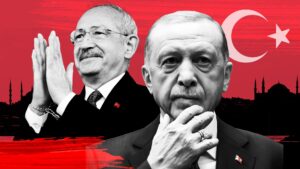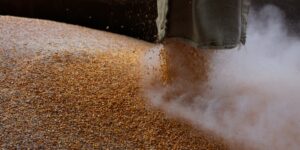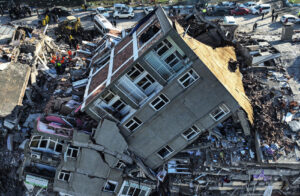
Turkish citizens living abroad have begun the voting process in the second round of presidential elections. A total of 156 polling stations were opened in 73 countries around the world.
Note that only in Germany there are about one and a half million registered Turkish voters.
In the second round of elections, Turkey’s incumbent president Recep Tayyip Erdoğan and a single opposition candidate Kemal Kılıçdaroğlu are represented. Turkish citizens at overseas polling stations can cast their votes until May 24.
In Rome, the Italian capital, Turkish voters lined up in front of the embassy despite inclement weather. Voting points will be available from May 20 to 22 at the embassy in Rome and at the consulate general in Milan.
Votes cast in favor of candidates in Madrid and Barcelona will be delivered to Turkey on regular Turkish Airlines flights under the supervision of diplomatic couriers, Turkish media reported.
In Turkey itself, the second round of elections is scheduled for Sunday, May 28. In the first round, Recep Tayyip Erdogan won four and a half percentage points more than his main rival Kemal Kılıçdaroğlu.
Earlier, the Club of Experts analyzed the chances of the candidates in the Turkish elections and gave a forecast of the development of the situation. The video is available at the link:

A new video on YouTube channel of the analytical center “Club of Experts” examined the options for the upcoming presidential and parliamentary elections in Turkey. Ukrainian experts expressed their opinions and gave forecasts regarding the political situation in this country.
Mohammad Farajallah, editor-in-chief of the Internet publication “Ukraine in Arabic,” stressed that the upcoming elections in Turkey are of great importance for the region and arouse the interest of the international community.
“Turkey is an important player on the world stage, and its domestic policy directly affects the situation in the region and beyond. Therefore, the results of the elections will be monitored with great attention,” he noted.
In turn, the founder of the Club of Experts, Maksim Urakin, Ph.D. in Economics, shared his vision of possible scenarios after the elections. He stressed that there are two main political forces fighting for leadership in Turkey: the Justice and Development Party (AKP) led by President Recep Tayyip Erdogan and the Republican People’s Party (CHP). Kemal Kılıcdaroğlu, allied with five other opposition political forces.
“Two scenarios are possible. If the AKP wins, we can expect a continuation of the policies Erdoğan has pursued in recent years, with a focus on enhancing domestic stability and strengthening Turkey’s position in the international arena. On the other hand, if the CHP wins, we may see a more pro-Western orientation and increased cooperation with the European Union and the United States,” the expert said.
According to Urakin, a win for either candidate in the first round is unlikely, and the winner of the presidential race will most likely be determined by a second ballot.
Both experts also noted the significance for Ukraine of the election results in Turkey.
“Ukraine has close economic and political ties with Turkey, so the election results will have a direct impact on our relations and cooperation. Over the last year, as a result of the war, trade turnover between our countries has decreased, but I believe that if the current political course is maintained, we can expect further development of trade and economic relations between Ukraine and Turkey,” said Maxim Urakin.
In addition, the expert cited statistics on exports from Ukraine to Turkey in 2022, according to which it has decreased significantly.
“Last year, the volume of Ukrainian exports to Turkey was about 3 billion dollars as opposed to more than 4 billion in 2021, that is, we see a drop of 29%,” Urakin said.
According to Mohammad Farajallah, in the current geopolitical situation Turkey is an important partner of Ukraine in various spheres, which include both military support (UAV Bayraktar, light armored vehicles) and cooperation in economy, energy and other spheres.
The expert also suggested that if the opposition wins, Turkey is more likely to join sanctions against Russia.
“Naturally, the new government will be as close to the West as possible and can be included in a common unified Western policy against Russia. This, of course, will be to our advantage. But these are just preliminary words for now, perhaps they (the opposition – ed.) will come, look at the numbers and continue Erdogan’s current policy,” said Farajallah.
It should be noted that on the eve of the voting, Erdoğan lags behind his main rival Kılıçdaroğlu by more than 5%, according to a poll published by the Turkish sociological center KONDA on May 11.
Thus, Erdoğan gets the support of 43.7 percent of respondents, while Kılıçdaroğlu gets 49.3 percent.
The poll also reveals that neither candidate gets more than 50% of the votes, which means that if these data are confirmed in the elections, the winner will be chosen in the second round, which is scheduled for May 28.
The KONDA polling service conducted personal interviews with 3,480 people in 35 provincial centers.
At the same time, according to other surveys, in particular the Istanbul-based Center for Operational Social Research (Yöneylem), Erdoğan’s party was supported by 35.2% of voters in the parliamentary elections and Kılıcdaroğlu’s CHP by 30.7%.
For more on Turkey’s elections, see the video:
Subscribe to the Experts Club channel by clicking here:
CLUB_EXPERTS, ELECTIONS, ERDOĞAN, MOHAMMAD FARAJALLAH, TURKEY, UKRAINE, URAKIN

The Joint Coordination Center (JCC) has resumed inspections of vessels coming from Ukraine with agricultural products within the framework of the Black Sea Grain Initiative, Sabah reported on Tuesday.
The relevant information earlier became known to the Turkish media from the Ministry of Defense of Turkey.
As the newspaper recalls, the day before, the UN said that on Sunday and Monday there were no inspections of ships.
Meanwhile, the Turkish Defense Ministry confirmed that Turkey, Ukraine, Russia and the UN will hold talks on the “grain initiative” on May 10-11.
Earlier, the Ukrainian Defense Ministry said that on May 8, Russia again blocked the work of the Grain Initiative, refusing to register vessels for entry and conduct inspections. According to the ministry, 90 vessels are awaiting inspection in Turkish territorial waters, of which 62 are vessels going in for loading. Inspections of both incoming and outgoing ships are suspended. Export of Ukrainian agro-products via the “grain corridor” did not even reach 3 million tons in April.
“Black Sea Grain Initiative” was concluded in Istanbul on July 22, 2022 with the participation of the UN, Ukraine, Turkey and Russia to create a corridor for the export of grain from three Ukrainian ports: “Chernomorsk”, “Odessa” and “Pivdenny”. The initiative was concluded for 120 days and was extended twice, most recently on March 18. However, while Ukraine claims it was extended for 120 days, Russia claims it was only for 60.

The number of victims of earthquakes that occurred in early February in the southeast of Turkey, exceeded the mark of 46 thousand people in this country, said Turkish President Recep Tayyip Erdogan.
“The number of victims of earthquakes in southeastern Turkey has reached 46,104,” he was quoted as saying by Anadolu Agency. Last week Ankara reported about 46 thousand dead, but at that time the issue was about data from two countries: Turkey and Syria.
According to Erdogan, the construction of 488 thousand new houses in the areas affected by earthquakes is planned.
The earthquake of magnitude 7.7 occurred in Turkey on the night of February 6, followed by a series of aftershocks, one of which had a magnitude of 7.6. These tremors caused serious damage and casualties in neighboring Syria as well.

The number of victims of earthquakes that occurred in early February in the south-east of Turkey has reached nearly 46 thousand people, the country’s Interior Minister Suleyman Soylu said.
“So far, 45,968,000 people have died as a result of earthquakes, including 4,267 Syrians,” Anadolu Agency quoted him as saying.
A magnitude 7.7 earthquake hit Turkey on the night of February 6, followed by a series of echo pushes, one of which had a magnitude of 7.6. The earthquake also caused serious damage and casualties in neighboring Syria.